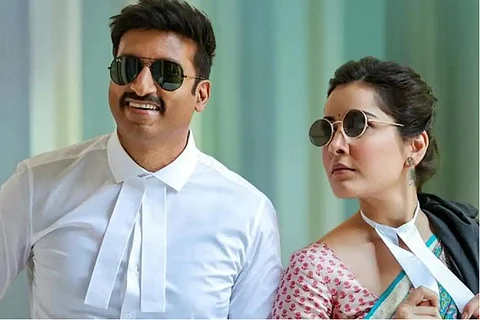

Director Maruthi’s Pakka Commercial is one of those films that end up making a satire of themselves unintentionally. The film, while ironically making fun of how television soaps present court proceedings to the audience – with monologues, silly staged and unrealistic depiction of events, ends up making a commentary about how this film belongs to the same category. Pakka Commercial stars actors Gopichand and Raashii Khanna, along with Sathyaraj, Rao Ramesh, Ajay Ghosh and others. The film is a courtroom drama. And one should not expect it to be anywhere close to reality, as the film amply makes it clear in the very title that it is a 'commercial' film. For the uninitiated, a typical commercial film is devoid of reality, logic and reasoning. Yet, one watches these films because they expect entertainment. And by the end of the review you can decide for yourself whether the film is entertaining or not.
Pakka Commercial is an unoriginal revenge story, with a small change in its plot. The film begins with Sathyaraj as Surya Narayana, an honest judge at a Sessions court. A guilt-ridden Surya Narayana resigns from the profession after delivering a verdict against a sexual harassment victim as the case lacks substantial evidence. His son Lucky, played by Gopichand, pretends to follow in his father’s footsteps of being ideal, ethical and working for justice. However, he is a crook who believes that his father’s honesty and self righteous actions have pushed them into poverty and misery.
Lucky’s reputation as a powerful lawyer capable of winning the toughest cases–very convenient to the plot–leads him to Vivek (played by Rao Ramesh). Vivek is an evil businessman who has established an empire through his criminal activity. Lucky’s client Vivek and his father Surya Narayana have a history. Vivek is the reason Surya Narayana steps down as a judge, unable to prosecute him in the sexual harassment case. Whether the dishonest son fights for his father’s cause, or sides with the corrupt villain forms the rest of the story.
Though the story is overly simplistic, a commercial film mandates a female actor, so we have Raashii Khanna playing the role of Jhansi, a television actor, who gets terminated from her job because of her unreasonable remuneration. Jhansi decides to fight her own case. As a method actor, the preparation she underwent to play the role of an advocate in a television soap gives her this confidence. But she does not realise that a courtroom in reality is not as portrayed in cinema or television. Her monologues and the nuisance she creates in the court gets her reprimanded by the judge, who punishes her to follow court proceedings and learn about the judicial system. She is further made to work under a senior lawyer for a brief period as part of the punishment. This is the best satire of the film itself, where the film takes the liberty of being “commercial” and does the same thing.
One example of how ill-researched the film is: in a dialogue Lucky is talking about how inefficient the judicial system is, and says that the Indian government spent Rs 100 crore towards Ajmal Kasab, the terrorist involved in the 26/11 attack, while he was in prison. A rudimentary search about the Ajmal Kasab case would have revealed that the public prosecutor, Ujwal Nikkam, cooked up stories like the one above, to influence public perception.
Raashii Khanna and her ensemble – Saptagiri and Harsha Chemudu – are supposed to offer humour in this revenge drama. However, despite Raashii’s best efforts, the writing is so poor that the comedy just falls flat. Probably learning that this alone would not work, the director tries to evoke laughter through Rao Ramesh and Ajay Ghosh by making them spew dialogues containing sexual innuendos, which only makes one cringe.
In the film Sathyaraj, a former judge, struggles to figure out how to find a missing person, and Raashii Khanna, who read law as part of the acting preparation offers him advice to file Habeas Corpus petition in the court. So it is no wonder that Sathyaraj utterly loses the case against his son multiple times.
The performances of actors Gopichand, Sathyaraj and Rao Ramesh are convincing. Raashii Khanna however deserves much of the appreciation for experimenting with comedy and succeeding with it. Jakes Bejoy is the music composer of the film, but the music is unimpressive.
Disclaimer: This review was not paid for or commissioned by anyone associated with the film. Neither TNM nor any of its reviewers have any sort of business relationship with the film's producers or any other members of its cast and crew.